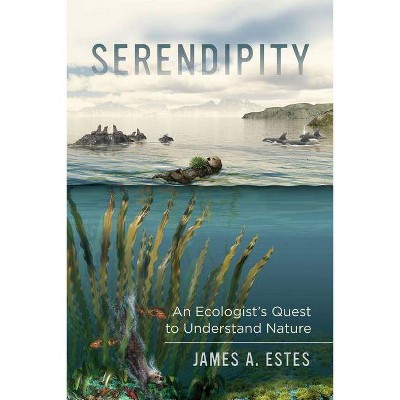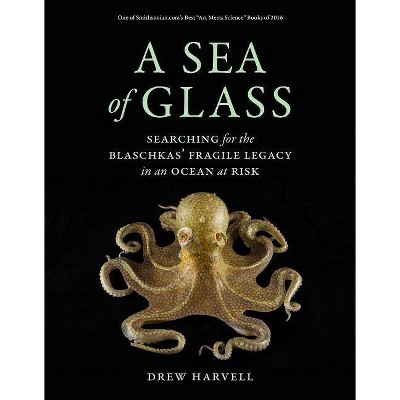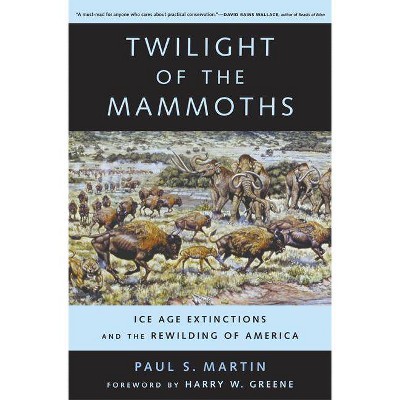Serendipity, 14 - (Organisms and Environments) by James A Estes (Hardcover)

Similar Products
Products of same category from the store
AllProduct info
<p/><br></br><p><b> About the Book </b></p></br></br>"To newly minted biologist James Estes, the sea otters he was studying in the leafy kelp forests off the coast of Alaska appeared to have an unbalanced relationship with their larger environment. Gorging themselves on the sea urchins that grazed among the kelp, these small charismatic mammals seemed to give little back in return. But as Estes dug deeper, he unearthed a far more complex relationship between the otter and its underwater environment, discovering that otters played a critical role in driving positive ecosystem dynamics. While teasing out the connective threads, he began to question our assumptions about ecological relationships. These questions would ultimately inspire a lifelong quest to better understand the surprising complexity of our natural world and the unexpected ways we discover it. Serendipity tells the story of James Estes's life as a naturalist and the concepts that drive his interest in researching the ecological role of large predators. Using the relationship between sea otters, kelp, and sea urchins as a touchstone, Estes retraces his investigations of numerous other species, ecosystems, and ecological processes in an attempt to discover why ecologists can learn so many details about the systems within which they work and yet understand so little about the broader processes that influence those systems. Part memoir, part natural history, and deeply inquisitive, Serendipity will entertain and inform readers as it raises thoughtful questions about our relationship with the natural world."--Provided by publisher.<p/><br></br><p><b> Book Synopsis </b></p></br></br><b>"Many of the findings in the book . . . are classics of ecology. . . . A rare and delightful insight into timely science."--Jane Lubchenco, <i>Nature</i> <p/> "Estes's refreshing narrative deftly weaves rigorous science with personal reflection to create an absorbing and introspective read that is equal parts memoir, ecological textbook, and motivational guidebook for young ecologists."--<i>Science</i></b> <p/> To newly minted biologist James Estes, the sea otters he was studying in the leafy kelp forests off the coast of Alaska appeared to have an unbalanced relationship with their greater environment. Gorging themselves on the sea urchins that grazed among the kelp, these small charismatic mammals seemed to give little back in return. But as Estes dug deeper, he unearthed a far more complex relationship between the otter and its underwater environment, discovering that otters play a critical role in driving positive ecosystem dynamics. While teasing out the connective threads, he began to question our assumptions about ecological relationships. These questions would ultimately inspire a lifelong quest to better understand the surprising complexity of our natural world and the unexpected ways we discover it. <p/><i>Serendipity</i> tells the story of James Estes's life as a naturalist and the concepts that have driven his interest in researching the ecological role of top-level predators. Using the relationships between sea otters, kelp, and sea urchins as a touchstone, Estes retraces his investigations of numerous other species, ecosystems, and ecological processes in an attempt to discover why ecologists can learn so many details about the systems in which they work and yet understand so little about the broader processes that influence these systems. Part memoir, part natural history, and deeply inquisitive, <i>Serendipity</i> will entertain and inform readers as it raises thoughtful questions about our relationship with the natural world.<p/><br></br><p><b> From the Back Cover </b></p></br></br>"James Estes's career and writings have demonstrated repeatedly that a top-down, predator-mediated view of ecosystem dynamics can explain a lot about nature's structure and dynamics. Reading this book will reward any naturalist/ecologist/modeler."--Michael E. Soule, Professor Emeritus, University of California, Santa Cruz; cofounder and first president of the Society for Conservation Biology and the Wildlands Network <p/> "This is a phenomenal book! Filled with fascinating and insightful stories told without bravado, it offers excellent advice to young scientists in the context of the development of a distinguished career. Estes's compelling narrative makes ecosystems come alive, and the result is that we learn the details of phase shifts, otter physiology, and urchin gametes without even realizing that we are learning."<i>--</i>Loren McClenachan<i>, </i>Elizabeth and Lee Ainslie Assistant Professor of Environmental Studies at Colby College <p/> "<i>Serendipity </i>does what few science books written for a general audience do: it reveals a preeminent marine ecologist's professional journey into science, and the astonishing turns that led to major breakthroughs and challenges along the way. Nobody could write this better--Estes has walked the walk."--Cristina Eisenberg, Chief Scientist, Earthwatch Institute, and author of <i>The Carnivore Way: Coexisting with and Conserving North America</i>'<i>s Predators</i> <p/> "If you like Alfred Russel Wallace and Charles Darwin, you will relish <i>Serendipity</i>, a remarkable journey of discovery--the modern version of challenge, intellectual and physical. From mollusks to whales, predators to people, James Estes unearths the dynamics of ecological interaction in a remote and wild place. Rich, innovative, and insightful, this beautifully written account is reminiscent of tropical expeditions 150 years earlier. But its messaging is relevant to today--over-harvesting, climate change, human impacts. Whereas Wallace and Darwin brought us theory and natural history, Estes agitates deeply: how science is done, how discoveries are made, and why results are challenged. Anyone interested in understanding why science matters for the trials facing our planet should start here."--Joel Berger, Senior Scientist, Wildlife Conservation Society, and author of <i>The Better to Eat You With</i><i>: Fear in the Animal World</i> <p/> "An inspiring voyage to the end of the Earth: the Aleutian Islands and the Arctic, populated by sea otters, polar bears, and walruses. Incredibly crafted to show the inner workings of a great naturalist, this memoir reveals Estes's 'aha moments' during his discovery of a voracious keystone species in an underwater seascape as wild, but even colder, than where George Schaller worked on gorillas, lions, and pandas."<i>--</i>Drew Harvell, Associate Director of Atkins Center for a Sustainable Future, Cornell University, and author of <i>A Sea of Glass: Searching for the Blaschkas' Fragile Legacy in an Ocean at Risk</i> <p/> "<i>Serendipity </i>is the amazing story of one of the world's most respected marine ecologist's lifelong quest to understand trophic cascades and their ecological impacts. Intertwining his own personal history with that of the North Pacific Ocean, Jim Estes entertains readers and inspires young scientists, but he also provides wise and well-documented counsel to those who want to conserve large predators [and] the nature they sustain in marine, freshwater, and terrestrial ecosystems worldwide."--Mary Power, Professor, University of Californioa, Berkeley; past president, Ecological Society of America<p/><br></br><p><b> Review Quotes </b></p></br></br><br>"This top-down picture--with predators influencing the health of plants--is depicted in enthralling detail."--<i>The Guardian</i>-- "The Guardian"<br><br>"An insightful reminder that when observing nature, there is always much more than meets the eye."-- "The Scientist"<br><br>"Estes's refreshing narrative deftly weaves rigorous science with personal reflection to create an absorbing and introspective read that is equal parts memoir, ecological textbook, and motivational guidebook for young ecologists."-- "Science"<br><br>"Many of the findings in the book . . . are classics of ecology. . . . A rare and delightful insight into timely science."-- "Nature"<br><br>"Noteworthy. . . .Summing up: Recommended." -- "CHOICE"<br><br>"Readers with a general interest in Alaska, wildlife, natural history and the way science proceeds from hypotheses to proofs will find much to appreciate here. Young people contemplating a science career might gain some significant insights into such a life."-- "Alaska Dispatch News"<br><p/><br></br><p><b> About the Author </b></p></br></br><b>James A. Estes</b> is Professor Emeritus of Ecology and Evolutionary Biology at University of California, Santa Cruz. He was coeditor of <i>Trophic Cascades: Predators, Prey, and the Changing Dynamics of Nature</i> and of <i>The Community Ecology of Sea Otters, </i><i> </i>and senior editor of <i>Whales, Whaling, and Ocean Ecosystems</i> (UC Press). He is a recently elected member of the National Academy of Sciences.
Price History
Price Archive shows prices from various stores, lets you see history and find the cheapest. There is no actual sale on the website. For all support, inquiry and suggestion messagescommunication@pricearchive.us



















